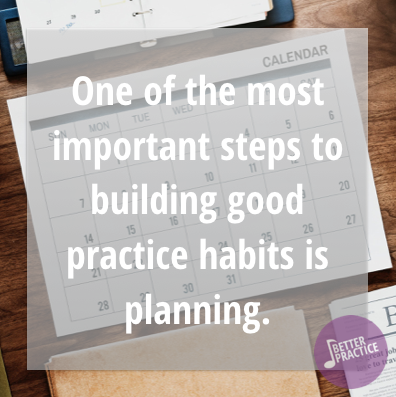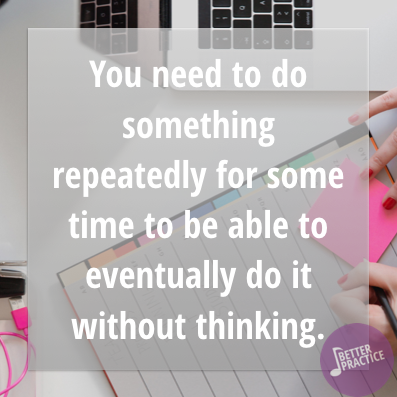This is a continuation from last week’s article: How To Make A Habit Stick. Make sure you read that first to understand the steps we use below! This week, we’ll explain and provide examples on how you can use these rules to create good practice habits.
Use this worksheet to create your habit plan using the article below as a guide.
1. Reduce Steps to Start
Reduce the number of steps you need to currently start your habit. The fewer the steps, the more likely you are to do it. Here’s an example of mine:
~~1. Clear my practice space~~
~~2. Pull over a chair~~
~~3. Find laptop/phone for backing tracks~~
~~4. Find/figure out what backing tracks I’ll need~~
~~5. Find an aux cord~~ Keep area clean, keep a chair/stool there at all times, have
backing tracks bookmarked or have songs to practice planned out, keep an aux cord in my amp
- Connect device to amp
- PLAY
2. Reduce Competition
Identify competition to you doing the habit (things like homework, video games, etc.) and how to work around it.
Competition: Homework
Like practicing, make sure you set a certain time to do homework. Maybe homework is set to 7pm and practice is set to 9pm, but you haven’t finished homework when 9 comes around. Instead of skipping or pushing it back, do practice at 9pm, even if it’s for a little, and finish your homework after.
Competition: Hanging out with friends
Stuff like this is on you if you’re serious about your goal. It’s easy to set your hang-outs to start either a little later (even 30 minutes or an hour is okay for practice!) or end early enough to get some practice in before bed.
3. Reduce Thinking
Plan your actions ahead of time so you don’t have to slow down in the moment.
It’s hard to be motivated to practice when you sit down, see your giant list of assignments, and aren’t sure how to tackle it. One of the most important steps to building good practice habits is PLANNING! Once you get home from lesson, look at what you have to work on for the week and divide it into digestible chunks each day. This article includes good examples on how to plan your practice over a week.

4. Trigger
Have a physical signal to begin the habit.
Set a phone alarm to practice every day. If your schedule varies, set one for each day (and you can have these repeat weekly). It’s best to keep the times as consistent as possible to create a habit.
5. Make It Addictive
Give yourself a small dopamine rush to reward your behavior so that your brain wants to keep coming back for more!
Save some of the “fun” practice for later: things like playing songs you already know or sight-reading some easy, new sheet music. Or, reward yourself with some chocolate when you accomplish a practice goal (my favorite).
6. Make It Subconscious
You need to do something repeatedly for some time to be able to eventually do it without thinking.
Set up a calendar in your room and mark each day you practice. Try to get at least 30 consecutive days in the first month! Remember – the harder you work and stay consistent in the beginning, the easier it will be later on (because it will start becoming a habit).

7. Be Accountable
Have others hold you accountable so it’s harder to quit!
Tell your parents (or sibling, close friend, etc.), “I’m going to practice at least 30 minutes every day”, or, “I’m going to be able to play this song by the end of the week.” In addition to keeping you on your toes, this works as a deterrent to quitting: there’s more shame involved when you quit early and have to tell a bunch of people about it.
######A wise man once told me that you can tell how successful someone will be by observing their habits. So get into the habit of creating good habits! See how Better Practice can help your daily habit easy, engaging, and smart.